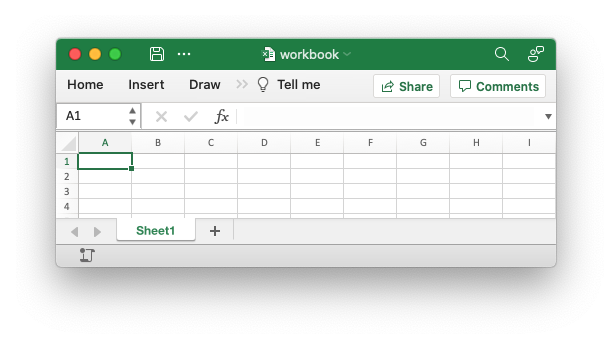Creating and saving an xlsx file
Creating a Workbook struct instance to represent an Excel xlsx file is done
via the Workbook::new() method:
// SPDX-License-Identifier: MIT OR Apache-2.0
//
// Copyright 2022-2026, John McNamara, jmcnamara@cpan.org
//! The following example demonstrates creating a simple workbook, with one
//! unused worksheet.
use rust_xlsxwriter::{Workbook, XlsxError};
fn main() -> Result<(), XlsxError> {
let mut workbook = Workbook::new();
let _worksheet = workbook.add_worksheet();
workbook.save("workbook.xlsx")?;
Ok(())
}Once you are finished writing data via a worksheet you can save it with the Workbook::save() method:
// SPDX-License-Identifier: MIT OR Apache-2.0
//
// Copyright 2022-2026, John McNamara, jmcnamara@cpan.org
//! The following example demonstrates creating a simple workbook, with one
//! unused worksheet.
use rust_xlsxwriter::{Workbook, XlsxError};
fn main() -> Result<(), XlsxError> {
let mut workbook = Workbook::new();
let _worksheet = workbook.add_worksheet();
workbook.save("workbook.xlsx")?;
Ok(())
}This will you a simple output file like the following.

The save() method takes a std::path or path/filename string. You can also
save the xlsx file data to a Vec<u8> buffer via the
Workbook::save_to_buffer() method:
// SPDX-License-Identifier: MIT OR Apache-2.0
//
// Copyright 2022-2026, John McNamara, jmcnamara@cpan.org
//! The following example demonstrates creating a simple workbook to a Vec<u8>
//! buffer.
use rust_xlsxwriter::{Workbook, XlsxError};
fn main() -> Result<(), XlsxError> {
let mut workbook = Workbook::new();
let worksheet = workbook.add_worksheet();
worksheet.write_string(0, 0, "Hello")?;
let buf = workbook.save_to_buffer()?;
println!("File size: {}", buf.len());
Ok(())
}This can be useful if you intend to stream the data.